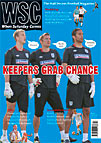 Other candidates bidding to stage the 2018 World Cup hope to benefit from recent indiscretions in England. Saul Pope reports
Other candidates bidding to stage the 2018 World Cup hope to benefit from recent indiscretions in England. Saul Pope reports
The official Russian reaction to Lord Triesman’s recent comments about Russia buying World Cup referees for Spain was to call the suggestion “absurd” and to embarrass the FA into sending a belated apology. Ordinary fans were equally incensed, many suggesting that it typified English conceit towards any nation other than the US.
But, more tellingly, to many Russians the comments were the final nail in the coffin of a project that was doomed to fail anyway. Ever since their representative put David Beckham “in the shade” at the official bid presentation, it had been felt Russia had a stronger case for hosting the 2018 World Cup than England. The ambitious bid, which involves 13 cities, 16 stadiums and a budget of up to $10 billion (£6.8bn), has already been described as “remarkable” by Sepp Blatter.
The Russian bid is one with heavyweight political backing and a lot of substance. The man who overshadowed Beckham with a polished presentation delivered in fluent English was First Deputy Prime Minister Igor Shuvalov. As well as a letter of support from Prime Minister Vladimir Putin, he handed over a 1,000-page document containing details of spectacular projected stadiums and quotations about candidate cities from Dumas, Tolstoy and Pushkin.
Beckham was lampooned in the Russian press for providing nothing more than a “pretty picture” and making general points that could be related to any of the candidates. It is expected that Putin may later head the bid, and that Vyacheslav Koloskov, FIFA vice president between 1980 and 1996, will also become a key figure.
Concerns that Russia is less developed than the other candidates have been brushed aside by Shuvalov – that everything needs to be done from scratch is considered an “advantage”. The Russian project certainly has the potential to change lives in terms of the renewed infrastructure it will leave behind. And although it would be easy to make comparisons with neighbouring Ukraine’s struggles to prepare for Euro 2012, the Russians point to their own preparations for the 2014 Winter Olympics in Sochi, which are running ahead of schedule.
However, a number issues have been glossed over, in particular some odd selections for host cities. They are almost exclusively located in geographical clusters in the European part of Russia, the only exception being Ekaterinburg, a large city just inside Asian Russia. Although the problem of moving fans across Russia’s time zones perhaps put the organisers off a bid spanning the entire country, the Siberian cities of Tomsk and Novosibirsk and the Ural city of Perm, all with teams in the Premier League, could have joined an eastern cluster. It is not clear what effect the “development of the whole social sector”, referred to by Shuvalov as a chief legacy of a successful bid, will have on the millions living in Siberia and beyond if the tournament is to totally bypass them.
Instead cities with teams playing at the second and third tiers in recent years are potential hosts. Ekaterinburg’s main team Ural, not in the top flight since 1996, attracted just 3,500 to their most recent second-level home game and Mordovia, the biggest team in Saransk, drew 7,000 in the same division. It has been promised that no white elephant stadiums will be built but this seems unlikely, even allowing for the use of temporary stands. If fear of transporting fans across large distances is what has restricted the bid chiefly to European Russia, then the organisers might have missed a trick. As well as benefiting more Russians, stretching things further east would have given both Europeans and Asians a good opportunity to visit the country, making it a truly unique and inclusive tournament.
World-class centrepiece stadiums in Moscow, Kazan and Sochi look impressive on paper. However, St Petersburg’s new arena, scheduled to finish in 2008, will now be completed at the end of 2011 following wrangling over funding between Gazprom and the city administration. Spartak Moscow’s new stadium was due to be finished in 2009, but now looks likely to be completed in 2012. The officials call these “temporary problems”, pointing once more to the good work in Sochi, though not all Russians are so sure. One, commenting on the bid at championat.ru wrote: “It’s all based on promises! We’ve got nothing here, no stadiums, roads, hotels, airports… we should have started building a few years ago. At least there was still some money around then.”
But whatever the details and the differences in opinion, the Russian bid is a serious contender. Lord Triesman’s indiscreet comments have opened the race ever wider.
From WSC 281 July 2010